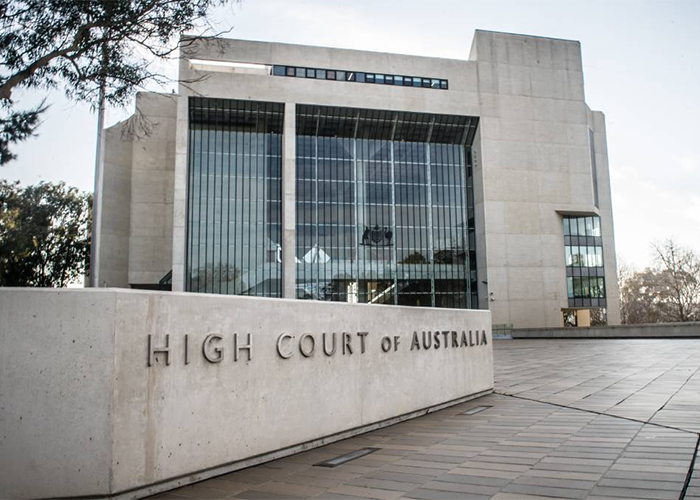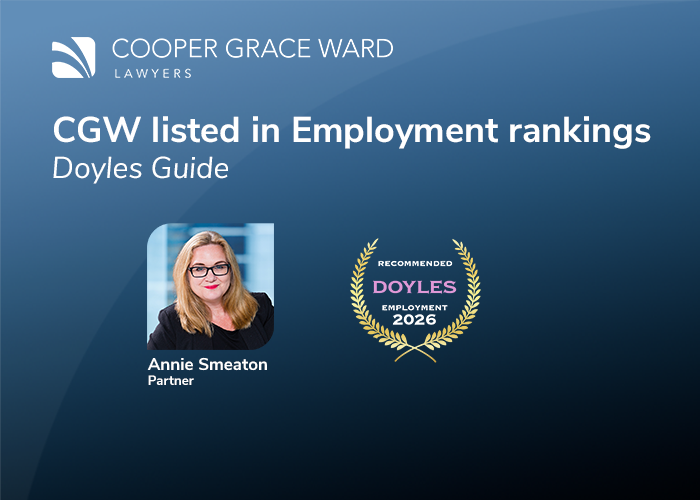CCIG Investments Pty Ltd v Schokman [2023] HCA 21
The High Court has unanimously determined that an employer was not liable for an employee who accidentally urinated on another worker while that other worker was asleep.
The judgment halts the expansion of the concept of vicarious liability and limits it to matters that have a sensible connection with employment – those where the action is authorised, required by or incidental to employment rather than those where employment is the mere opportunity for the action to occur.
Cooper Grace Ward was proud to represent the employer (and WorkCover Queensland) in this matter.
Background
The plaintiff was a 25-year-old hospitality worker at the Daydream Island Resort. He suffered unusual injuries in highly unusual circumstances, aggravating a pre-existing sleep disorder and pre-existing cataplexy.
The plaintiff was the restaurant supervisor and, as part of his employment contract, he agreed to share accommodation.
In the early hours of 7 November 2016, the plaintiff woke to his flatmate urinating on him. It was common ground that what was described by the trial judge (Justice Crow of the Queensland Supreme Court) as the ‘urination event’ was an accident.
While there was a suggestion the event occurred due to the flatmate’s ‘gross intoxication’ or sleepwalking, his Honour found the incident occurred because the flatmate was ‘in a state of semi consciousness precipitated by his level of intoxication’.
The decision at trial
The Supreme Court dismissed Mr Schokman’s claim on the following basis:
- In the absence of evidence about previous incidents between roommates or an alcohol problem, the employer did not have a duty to take any measures in response to the risk.
- If the employer did not have a reasonable alcohol policy, Mr Schokman had not proven it would have prevented the ‘urination event’.
- There was ‘not a connection or nexus between the employment enterprise and the wrong committed’ by the flatmate to impose vicarious liability.
The Queensland Court of Appeal
The plaintiff appealed the trial judge’s decision on the issue of vicarious liability alone.
The Court of Appeal allowed Mr Schokman’s appeal, primarily on the basis that the case was analogous to the now 100-year-old High Court case of Bugge v Brown.[i] In that case, a jackaroo negligently lit a fire in the course of preparing a meal. The fire spread and destroyed property on an adjoining farm. The Court of Appeal in the Schokman case found the requisite connection between the flatmate’s actions and employment by focussing on the requirement for the plaintiff and his flatmate to share accommodation.
The High Court
The High Court observed that vicarious liability is based on a policy of law that, rather than require an innocent party to bear a loss, it is just to impose liability on an employer where an employee, in carrying out the employer’s business, caused the loss.
The High Court has very clearly reinforced the principle that, for vicarious liability to arise, the tortious act must arise ‘in the course of’ or ‘scope of’ employment. Adopting the language of Isaacs J in Bugge v Brown, an employer is not liable for acts committed by employees as a ‘stranger’, including acts ‘so remote from [their] duty as to be altogether outside of, and unconnected with [their] employment’.
The leading judgment was written by Kiefel CJ, Gageler, Gordon and Jagot JJ who found ‘… without more the drunken act of urinating on another employee whilst they are asleep was not connected to anything the employee was required to do’. In dismissing the analogy with Bugge v Brown, their Honours stated, ‘Nothing in the present case points to the drunken act in question being authorised, being in any way required by, or being incidental to, the employment. In truth, it had no real connection to it.’ Further, ‘the most that could be said to arise from the circumstances of the shared accommodation was that it created physical proximity between the two men’ but that was an ‘insufficiently strong connection with employment to establish vicarious liability’.
The Court made the point of drawing a distinction with cases such as Prince Alfred College Inc v ADC (involving the sexual abuse of a child in a school) where employment may provide the very occasion for the relevant act to occur. In those cases, considerations such as ‘authority, power, trust, control and the ability to achieve intimacy with the victim’ become relevant. As Edelman & Steward JJ explained, in the Schokman case the flatmate did not perform the negligent act at a time and place where his employer was permitted to be present or to monitor him; it occurred during his leisure time.
Conclusion
Since tort reform and before, we have certainly seen ‘concept creep’ in this area.
Schokman should see a return to a sense of balance with employers and their insurers being able to confidently reject claims involving tenuous connections with employment.
The decision should give particular comfort to employers of remote workers, such as those in the mining, tourism and construction industries, who need to accommodate workers even when in their leisure time.
[i] (1919) 26 CLR 110.








